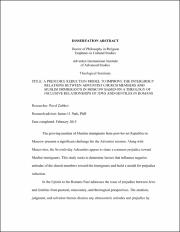| dc.description.abstract | Adventists appear to share a common prejudice toward
Muslim immigrants. This study seeks to determine factors that influence negative
attitudes of the church members toward the immigrants and build a model for prejudice
reduction.
In the Epistle to the Romans Paul addresses the issue of prejudice between Jews
and Gentiles from pastoral, missionary, and theological perspectives. The creation,
judgment, and salvation themes dismiss any ethnocentric attitudes and prejudice by
submitting both Jews and Gentiles as one body in Christ, thereby providing a basis for
inclusive relationships and further cross-cultural endeavor to Spain.
The proposed model for prejudice reduction included 2 dependent variables
(social distance and prejudice), 5 moderating variables (symbolic threat, realistic threat,
ethnocentrism, stereotypes, and intergroup anxiety), and 3 independent variables
(intergroup contact, in-group identity, and spirituality). Data collected from 16 churches
and 200 respondents were analyzed using AMOS version 17 and structural equation
modeling software package.
The study found that spirituality, realistic threat, and intergroup anxiety have a
direct effect on prejudice and explain 72% of its variance. Realistic threat and prejudice
have a direct effect on social distance and explain 41% of its variance. Further, the study
found that spirituality, realistic threat, and stereotypes have a direct effect on intergroup
anxiety and explain 31% of its variance. It was also found that realistic threat had a direct
effect on stereotypes and explain 28% of its variance.
The findings of this study suggest spirituality to be the primary means in reducing
prejudice toward Muslim immigrants. It also suggests realistic threat to have more
significant effect on attitudes of church members than symbolic threat. Likewise, the
moderating effect of emotional factor (intergroup anxiety) has far greater influence on
prejudice and social distance than that of cognitive (stereotypes).
This study may be useful for pastors, church leaders, and church members who
seek to eliminate cross-cultural barriers between the church and Muslim immigrants in
Moscow. It is recommended that pastors and church leaders enhance the community
element in Moscow churches by generating the practice of fellowship and hospitality
among church members. Proper attention should be given to improving quality of
relationships with God and other people, especially with regards to the young adults, 20-
29 years old, who appeared to be the most prejudiced group in the church. Likewise, the
church needs to be more educated in cross-cultural communication and cultural diversity;
furthermore, it should be involved in ministry and witnessing to Muslim immigrants, who
yet remain unreached by the Adventist mission in Moscow. | en_US |

